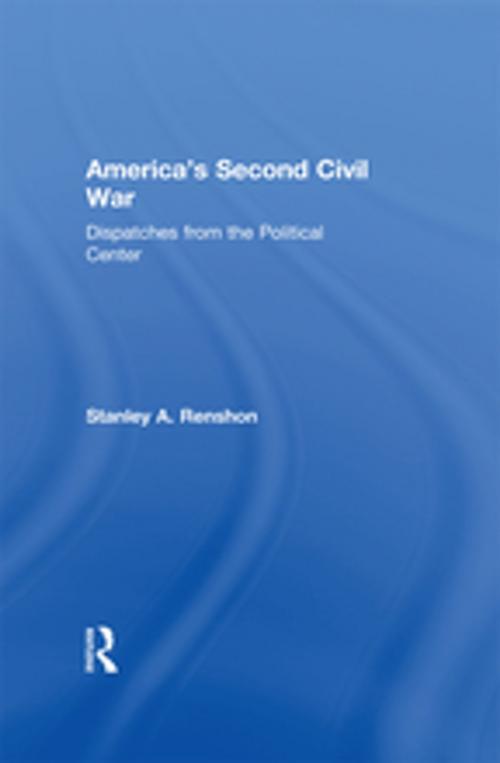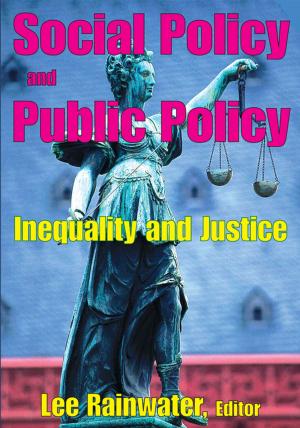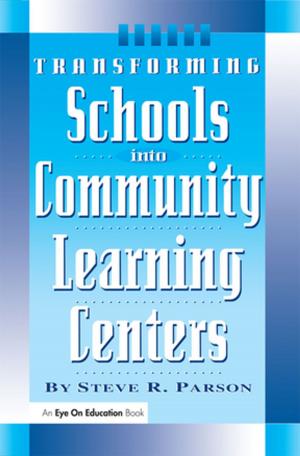America's Second Civil War
Dispatches from the Political Center
Nonfiction, Social & Cultural Studies, Political Science, Politics, History & Theory| Author: | Stanley A. Renshon | ISBN: | 9781351532112 |
| Publisher: | Taylor and Francis | Publication: | December 2, 2017 |
| Imprint: | Routledge | Language: | English |
| Author: | Stanley A. Renshon |
| ISBN: | 9781351532112 |
| Publisher: | Taylor and Francis |
| Publication: | December 2, 2017 |
| Imprint: | Routledge |
| Language: | English |
"America has always taken a coherent national identity for granted. In recent decades that assumption has been challanged. Individual and group rights have expanded, eliciting acerbic debate about the legitimacy and limits of claims. National political leaders have preferred to finesse rather engage these controversies. At the same time, large numbers of new immigrants have dramatically made the United States more racially, ethnically, and culturally diverse. As a result this country faces critical political and cultural questions. What does it mean to be an American? What, if anything, binds our country and citizens together? Is a ""new American identity"" developing, and if so, what is it? Can political leaders help us answer these questions?For the second time in the history of the United States another civil war looms. Tthe new danger lies in conflicts among people of different racial, cultural, and ethnic heritages, and between those who view themselves as culturally, politically, and economically disadvantaged versus those whom they see as privileged. Unlike the first Civil War, the antagonists cannot take refuge in their family or their religious, social, cultural or political organizations. These are the precisely the places were the war is being fought. At issue is whether it is possible or desirable to preserve the strengths of a common heritage. Some quarters insist that our past has resulted in a culture only worth tearing down to build over, rather than one worth keeping and building upon.We are in conflict over the viability of American culture and identity itself.This volume is organized into a series of intellectually grounded but provocative chapters on political leadership, the 2000 presidential campaign. Immigration, affirmative action, and other contemporary social and political issues. Renshon uses the perspective of political psychology to help us to see old issues in new ways, and new issues in different ways. His critical questi"
"America has always taken a coherent national identity for granted. In recent decades that assumption has been challanged. Individual and group rights have expanded, eliciting acerbic debate about the legitimacy and limits of claims. National political leaders have preferred to finesse rather engage these controversies. At the same time, large numbers of new immigrants have dramatically made the United States more racially, ethnically, and culturally diverse. As a result this country faces critical political and cultural questions. What does it mean to be an American? What, if anything, binds our country and citizens together? Is a ""new American identity"" developing, and if so, what is it? Can political leaders help us answer these questions?For the second time in the history of the United States another civil war looms. Tthe new danger lies in conflicts among people of different racial, cultural, and ethnic heritages, and between those who view themselves as culturally, politically, and economically disadvantaged versus those whom they see as privileged. Unlike the first Civil War, the antagonists cannot take refuge in their family or their religious, social, cultural or political organizations. These are the precisely the places were the war is being fought. At issue is whether it is possible or desirable to preserve the strengths of a common heritage. Some quarters insist that our past has resulted in a culture only worth tearing down to build over, rather than one worth keeping and building upon.We are in conflict over the viability of American culture and identity itself.This volume is organized into a series of intellectually grounded but provocative chapters on political leadership, the 2000 presidential campaign. Immigration, affirmative action, and other contemporary social and political issues. Renshon uses the perspective of political psychology to help us to see old issues in new ways, and new issues in different ways. His critical questi"















